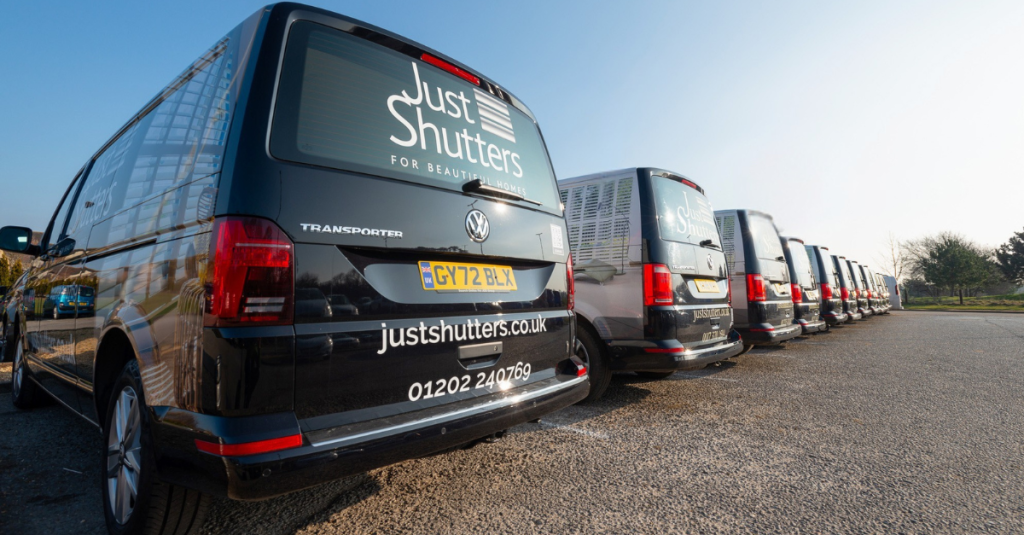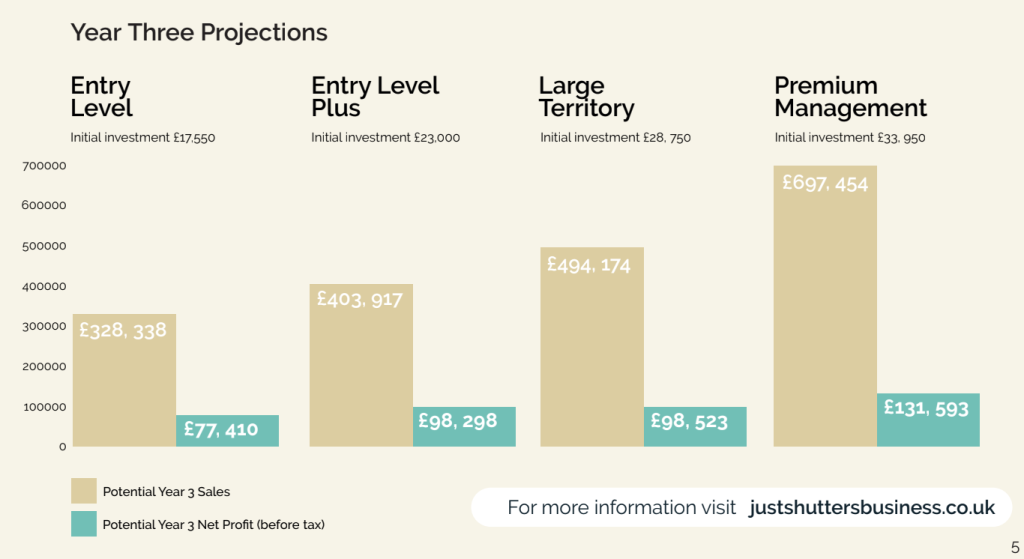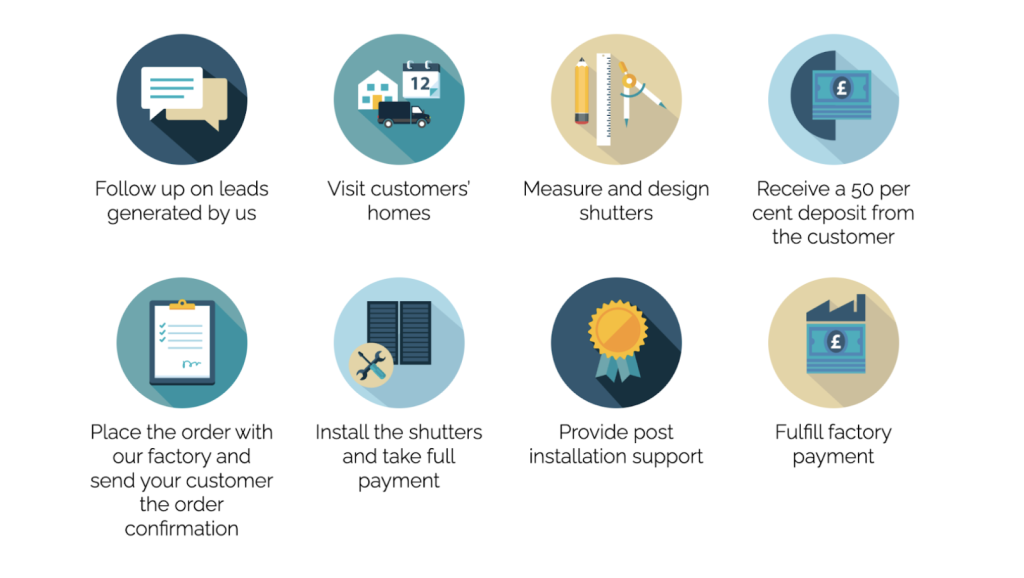The franchise model is a popular and potentially lucrative way to run your own business as part of an established brand.
The Just Shutters franchise was created in 2009 and has since grown in size and stature to offer franchising opportunities from every corner of the UK.
With a high success rate and a long history of happy franchisees, we know just how successful the franchise model can be. Here we look at exactly what franchising is, and how it works as a business model.
What is a franchise?
A franchise is a business model whereby one party (the franchisor) grants another party (the franchisee) the rights to trade products and services under its established brand and business system.
In return, the franchisee pays certain fees and agrees to comply with obligations set out in the franchise agreement. The nature of your franchise agreement will vary depending on the level of initial investment, the size of territory, and other factors.
Likewise, the returns you can expect as a franchise owner will also vary depending on your franchise package.
For example, our entry-level franchise package costs £17,550 + VAT as an initial investment, with potential year 3 sales of £328,338. A premium management package costs £33,950 + VAT, with potential year 3 sales of £697,454. You can view all four of our franchise packages and decide which is best for you.

How does a franchise work?
Franchising is commonly used as an alternative growth strategy for business expansion, as opposed to expansion through owned outlets or chain stores.
This strategy reduces the franchisor’s capital investment and liability risk, and allows franchisees to hit the ground running as they buy into an established brand with a captive audience.
“Franchising is a great way to get into business where you’re building something of value, but without all of the risks of a start-up on your own.”
Chris Rocker, Just Shutters founder
Whilst some countries have explicit regulations, there is no legislation regulating franchising in the UK. The UK franchising industry self-regulates through the British Franchise Association. General English contract, intellectual property, real estate, and competition laws all apply to franchising.
To become a member of the British Franchise Association (BFA), the business model must be piloted within the UK for at least one year and must sufficiently demonstrate that the model is viable.
The BFA set out four key requirements for consideration:
Viable
The model must have a proven track-record of success and must have potential longevity. Franchisees must be capable of achieving levels of profit that will sustain their business.
Transferable
The franchisor must have the benefit of know-how that can be successfully transferred, along with a system of initial and ongoing training & support to the franchisee.
Ethical
The franchise model must be structured and operated in accordance with the ethical principles set out in the BFA’s code of ethics.
Disclosed
All business information that is material to the franchise proposition and contract must be disclosed to franchisees without ambiguity.

The Franchisor’s Role
The franchisor is the creator of the franchise and its legal owner. They have built the brand, business model, and trademark, and are responsible for providing the franchisee with the products/services to be marketed under the brand’s name.
As part of the Just Shutters franchise agreement, the franchisor will provide:
- An exclusive market territory
- Branded van and sales kit
- Comprehensive product training
- Marketing & business support
- The majority of business leads (70% on average)

The Franchisee’s Role
The franchisee is responsible for running the franchise as an independent business owner. This takes a slightly different form between every franchise model, but fundamentally it is the franchisee’s responsibility to grow their business while operating under the existing business standards.
Franchisees at Just Shutters enjoy autonomy and flexibility in their role as business owners. We provide most of your leads as well as a branded van, sales kit, and materials. This allows you to focus on selling our beautiful plantation shutters and providing an amazing customer experience.
Key responsibilities for our franchisees include:
- Following up on leads
- Visiting prospective customers and selling shutters
- Taking measurements and placing orders with our factory
- Installing the shutters and providing post-installation support
Check out a day in the life of our franchisees to see what a typical day looks like.

Watch the Just Shutters Franchise Customer Journey

Types of franchise business models
Franchise models have been adapted to many industries, and there are several different types of franchise you can choose from. Five of the most common types are:Job Franchise
This franchise model is designed to be owned and run by one person. It is generally a low investment opportunity often operated from your own home. Buying a job franchise means you are creating a job and income for yourself – hence the name. Examples include cleaning services and mobile coffee vans.Investment Franchise
At the opposite end of the scale is an investment franchise – a large scale operation that requires significant capital expenditure. The franchisee will rarely be involved in the day-to-day running of the business and will require a professional management team to operate it. Examples include hotel and restaurant franchises.Distribution Franchise
A distribution franchise usually means that the franchisee operates under their own identity rather than adopting the franchisor’s brand name. They are granted the right to sell the franchisor’s products/services, but under their own name. Car dealerships are one example of a distribution franchise.Business Franchise
A business franchise model is what most people think of when thinking of a typical franchise. Everything needed to operate the business is provided by the franchisor, including equipment, products, training, and marketing support. Examples include fast-food restaurants and shutter companies (yes, that’s us!).Conversion Franchise
This type of franchise model is for independent business owners already operating in the franchisor’s sector, and who wish to convert their business into a franchise branch. Examples include hairdressers and dental/medical clinics.Franchising with Just Shutters Business
Shutters have become hugely popular in recent times, with a significant spike in interest during COVID years. As with most products and services that saw a boom during lockdowns, interest in shutters has returned to expected levels whilst maintaining its upward trajectory.Shutters are a versatile window covering that is stylish, affordable, and low maintenance compared to curtains or blinds. They are easy to operate, providing effortless privacy and light control as well as thermal insulation.
All this goes to show that the popularity of shutters isn’t going anywhere anytime soon, and as a franchise model there are so many advantages.
If you are interested in a Just Shutters business franchise and would like to learn more, you can request a free information pack with financials based on our existing franchisees, including sales, profits, and three-year projections.
Alternatively, give us a call on 01202 233744 or email business@justshutters.co.uk.


